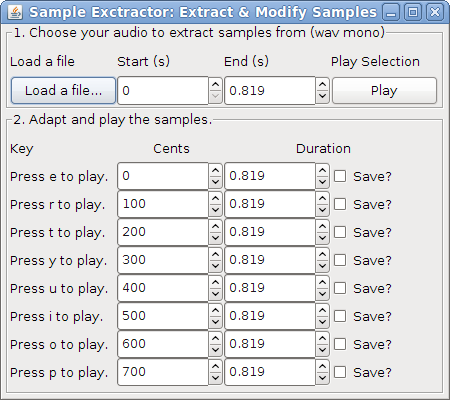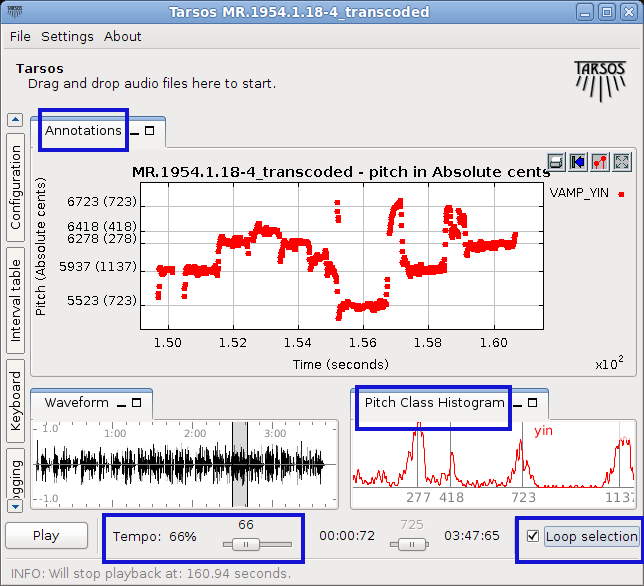» By Joren on Friday 21 December 2012
The DSP library for Taros, aptly named TarsosDSP, now includes an example showing how to synthesize cat sounds. The inspration came from this youtube video
To hear what exactly it does, listen to the following audio example.
There is also a command line interface, the following command does
\
java -jar Catify-latest.jar in.mid\
_______ _____ _____ _____
|__ __| | __ \ / ____| __ \
| | __ _ _ __ ___ ___ ___| | | | (___ | |__) |
| |/ _` | '__/ __|/ _ \/ __| | | |\___ \| ___/
| | (_| | | \__ \ (_) \__ \ |__| |____) | |
|_|\__,_|_| |___/\___/|___/_____/|_____/|_|
----------------------------------------------------
Name:
TarsosDSP catify'er
----------------------------------------------------
Synopsis:
java -jar Catify-latest.jar input.mid
----------------------------------------------------
Description:
The source code of the Java implementation of the catify’er can be found on the TarsosDSP github page.
 Code, Java, and HoGent
Code, Java, and HoGent
» By Joren on Wednesday 19 December 2012
The DSP library for Taros, aptly named TarsosDSP, now includes an example showing how to synthesize pitch estimations. The goal of the example is to show which errors are made by different pitch detectors.
To test the application, download and execute the Resynthesizer.jar file and load an audio file. For the moment only 44.1kHz mono wav is allowed. To hear what exactly it does, compare the following two audio fragments:
There is also a command line interface, the following command does pitch tracking, and follows the envelope of in.wav and immediately plays it on the default audio device. If you want to save the audio, see the command line options. The “flute example”:[flute.wav] is provided for your convenience.
\
java -jar Resynthesizer-latest.jar in.wav\
_______ _____ _____ _____
|__ __| | __ \ / ____| __ \
| | __ _ _ __ ___ ___ ___| | | | (___ | |__) |
| |/ _` | '__/ __|/ _ \/ __| | | |\___ \| ___/
| | (_| | | \__ \ (_) \__ \ |__| |____) | |
|_|\__,_|_| |___/\___/|___/_____/|_____/|_|
----------------------------------------------------
Name:
TarsosDSP resynthesizer
----------------------------------------------------
Synopsis:
java -jar CommandLineResynthesizer.jar [--detector DETECTOR] [--output out.wav] [--combined combined.wav] input.wav
----------------------------------------------------
Description:
Extracts pitch and loudnes from audio and resynthesises the audio with that information.
The result is either played back our written in an output file.
There is als an option to combine source and synthezized material
in the left and right channels of a stereo audio file.
input.wav a readable wav file.
--output out.wav a writable file.
--combined combined.wav a writable output file. One channel original, other synthesized.
--detector DETECTOR defaults to FFT_YIN or one of these:
YIN
MPM
FFT_YIN
DYNAMIC_WAVELET
AMDF
The source code of the Java implementation of the synthesizer can be found on the TarsosDSP github page.
 HoGent, Java, and TarsosDSP
HoGent, Java, and TarsosDSP
 Pitch_Estimation_Synthesizer.png and flute.wav
Pitch_Estimation_Synthesizer.png and flute.wav
» By Joren on Thursday 13 December 2012
The DSP library for Taros, aptly named TarsosDSP, now includes an implementation of a pitch shifting algorithm (as of version 1.4) and a time stretching algorithm. Combined, the two can be used for something like phase vocoding. With a phase vocoder you can load an audio snippet, change the pitch and duration and e.g. create a library of snippets. E.g. by recording one piano key stroke, it is possible to generate two octaves of samples of different lengths, and use those in stead of synthesized samples. The following example application shows exactly that, implemented in the java programming language.
The example application below shows how to pitch shift and time stretch a sample to create a sample library with the TarsosDSP library.
<a href=/releases/TarsosDSP/TarsosDSP-latest/TarsosDSP-latest-Examples/SampleExtractor-latest.jar">

</a>
Find your oven fresh baked binaries at the TarsosDSP Release Repository.
 HoGent, TarsosDSP, and WSOLA
HoGent, TarsosDSP, and WSOLA
 _Extract___Modify_Samples.png
_Extract___Modify_Samples.png
» By Joren on Wednesday 05 December 2012
Today marks the reslease of Tarsos 1.0 . The new Tarsos release contains practical transcription features. As can be seen in the screenshot below, a time stretching feature makes it easy to loop a certain audio fragment while it is playing in a slow tempo. The next loop can be played with by pressing the n key, the one before by pressing b.
Since the pitch classes can be found in a song, and there is a feature that lets you play a MIDI keyboard in the tone scale of the song under analysis, transcription of ethnic music is made a lot easier.
The new release of Tarsos can be found in the Tarsos release repository. From now on, nightly releases are uploaded there automatically.
 Computational musicology, Tarsos, Computational ethnomusicology, Music Information Retrieval, featured, WSOLA, HoGent, and Java
Computational musicology, Tarsos, Computational ethnomusicology, Music Information Retrieval, featured, WSOLA, HoGent, and Java


 </a>
</a>
 \
\